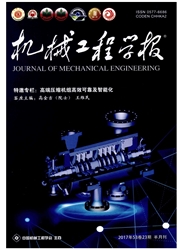

 中文摘要:
中文摘要:
通过研究隔套材料热学特性对空间机械臂热预紧力的影响,为空间机械臂热预紧力建模和解决交变温度可能诱发的失效提供理论指导。以空间机械臂中的主轴一轴承系统为研究对象,构建空间机械臂热预紧力预测模型,提出一种选取最佳隔套材料来减缓或消除空间机械臂热预紧力的方法。在不改变主轴一轴承系统结构的基础上,基于变形协调关系,依据隔套材料热学特性对热预紧力的影响规律,研究不同热膨胀系数的隔套对空间机械臂热预紧力的减缓效果。研究结果表明:施加于轴承上的轴向力增加,经轴承配合处摩擦力截留之后,预紧力依然增加;交变温度升高,航天轴承上的预紧力增加但内圈过盈量降低,与此同时分析了空间机械臂潜在失效模式。进一步研究发现:当热膨胀系数小于7×10^-6m/℃时,热膨胀系数增加,热预紧力随交变温度的变化率减小;当热膨胀系数大于8×10^-6m/℃时,热膨胀系数增加,热预紧力随交变温度的变化率增大。隔套材料热膨胀系数在7.6×10^-6~7.7×10^-6m/℃之间时,交变温度引起的热预紧力被大幅度减缓或消除。
 英文摘要:
英文摘要:
By investigating the influence of thermal expansion coefficient of spacer on the thermal preload of space manipulator, the theoretical guidance is provided to establish the model of the thermal preload on space manipulator and the failure that caused by alternating temperature. By taking the shaft-bearing system in space manipulator as a research object, the prediction model of thermal preload on space manipulator is established. In addition, a method that can mitigate or eliminate the thermal preload on space manipulator by choosing the best material for the spacer is proposed. Based on the changeless structure of shaft-bearing system and the compatibility deformation and the influence law of thermal characteristic of spacer material on thermal preload of space manipulator, the mitigating effect is investigated to show the effect of different spacer material on the thermal preload of space manipulator. The result indicates that, the preload increases after the interception by the friction at the bearing fit when the axial force acted on the bearing increases; if the alternating temperature increases, the hearing preload will increase and the magnitude interference of inner ring will decrease. Beyond that, the possible failure modes are analyzed as well. Furthermore, the influence results are obtained by using different thermal expansion coefficient. When the thermal expansion coefficient is less than 7×10^-6m/℃ the change rate of thermal preload decreases with alternating temperature, and the thermal expansion coefficient increases; when the thermal expansion coefficient is more than 8×10^-6m/℃, the change rate of thermal preload increases with alternating temperature; if the thermal expansion coefficient is between 7.6×10^-6m/℃ and 7.7×10^-6m/℃, the thermal preload stimulated by alternating temperature will be mitigated sharply or eliminated.
 同期刊论文项目
同期刊论文项目
 同项目期刊论文
同项目期刊论文
 期刊信息
期刊信息
